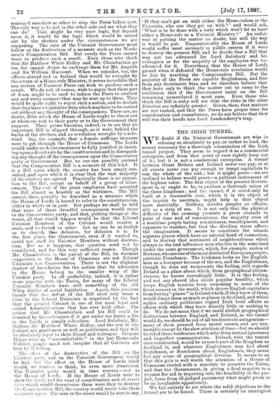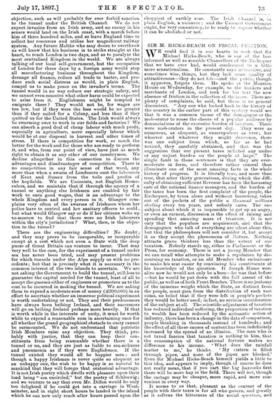THE IRISH TUNNEL.
WE doubt if the Unionist Government are wise in refusing so absolutely to pay, or rather to lend, the money necessary for a thorough examination of the Irish tunnel project. They seem to regard it as a commercial enterprise, and from that point of view rightly keep out of it ; but it is not a commercial enterprise. A tunnel between Great Britain and Ireland never can pay, or at all events never can pay enough to tempt capitalists to run the whole of the risk ; but it might prove—we are inclined to believe would prove—a political instrument of the highest value. The first object of the present Govern- ment is, or ought to be, to produce a thorough union of the three kingdoms ; and the tunnel, if it could only be built at a reasonable cost, which it is the object of the inquiry to ascertain, might help in that object most materially. Nothing divides peoples so effectu- ally as a strip of sea. It is not only that the physical difficulty of the crossing presents a great obstacle in point of time and of convenience, the majority even of a maritime people hating sea-sickness, transhipment, and exposure to weather, but that the dividing water affects the imagination. It seems to constitute the islands separate places which have no natural bond of connection, and to destroy that sentiment of neighbourliness which always in the end influences men who live in the same land under the same government, which, for example, makes of Bretons, who areone of the most distinct of European peoples, patriotic Frenchmen. The Irishman looks on the English- man as a foreigner because of the sea, and the Englishman, though he does not reciprocate the feeling, still regards Ireland as a place about which, from geographical circum- stances, he knows exceedingly little. It is this feeling, and not any absurd idea about popular hostility, which keeps English tourists from swarming in some of the finest scenery in the world, which deters English capitalists from buying " places " in Ireland which,if they knew of them, would tempt them as much as places in Scotland, and which makes ordinary politicians regard Irish local affairs as affairs with which they have directly little or nothing to do. We do not mean that if we could abolish geographical distinctions between England and Ireland, as the tunnel would do, we should be rid of all tendencies to antagonism— many of them proceed from moral causes, and are irre- movable except by the slow attrition of time—but we should be rid of those tendencies which arise from mutual ignorance and imperfect communication. Ireland, with the tunnel once constructed, would be as much part of the Kingdom as Scotland is, and whatever Englishmen may feel about Scotchmen, or Scotchmen about Englishmen, they never feel any sense of geographical division. It seems to us that this gain is well worth the attention of a House of Commons elected with a mandate to preserve the Union, and that the Government, in giving a final negative to a request for aid in inquiring into the feasibility of the pro- ject, loses from ill-judged parsimony what might prove to be an invaluable opportunity. We fail entirely to see where the solid objections to the tunnel are to be found. There is certainly no strategical objection, such as will probably for ever forbid sanction to the tunnel under the British Channel. We do not expect invasion from an Irish army, and no enemy in his senses would land on the Irish coast, with a march before him of three hundred miles, and so leave England time to collect her resources and utilise her magnificent railway system. Any future Moltke who may desire to overthrow us will know that his business is to strike straight at the heart, to reach London in two days, and so to paralyse the most centralised Kingdom in the world. We are always talking of our local self-government, but the occupation of London for three days by a foreign army would stop all manufacturing business throughout the Kingdom, derange all finance, reduce all trade to barter, and pro- duce such social distress as would, in plain English, compel us to make peace on the invader's terms. The tunnel would in no way reduce our strategic safety, and we cannot even conceive what other harm could be expected to arise from it. Englishmen might be tempted to emigrate there ? They would not be, for wages are too low, but if they were the loss would be no greater than if they sailed for a Colony, and less than if they quitted us for the United States. The Irish would always be swarming over to work in our fields and factories ? We can absorb a good deal of cheap labour with much profit, especially in agriculture, more especially labour which would be at our disposal in harvest and other times of stress. If there is competition for work, so much the better for the work and for those who are ready to perform it, and who, from our point of view, have just as much right to obtain it as any other of our countrymen. We decline altogether in this connection to discuss the advantages and disadvantages of competition. There is no competition in any fair sense of that word, any more than when a swarm of Londoners oust the labourers of Kent and Sussex from the toils and profits of the hopfields. We are Unionists, not English Home- rulers, and we maintain that if through the agency of a tunnel or anything else Irishmen are enabled by fair work to earn good wages, that is an advantage to the whole Kingdom and every person in it. Glasgow com- plains very often of the swarms of Irishmen whom her police have to control and her sanitary officers to scold, but what would Glasgow say or do if her citizens woke up to-morrow to find that there were no Irish labourers within the city's jurisdiction ? What, then, is the objec- tion to the tunnel ?
There are the engineering difficulties ? No doubt ; and they may prove to be insuperable, or insuperable except at a cost which not even a State with the deep purse of Great Britain can venture to incur. That may very well be the case, for the experiment of a tunnel under sea has never been tried, and may present problems for which tunnels under the Alps supply us with no pre- cedents; but that is precisely what it is necessary in the common interest of the two islands to ascertain. We are not asking the Government to build the tunnel, still less to guarantee the capital needed for the tunnel, least of all to accept the guesses either of engineers or promoters as to the cost to be incurred in making the tunnel. We are asking them to expend a moderate sum of money (X200,000) in an effort to ascertain whether an immense political experiment is worth undertaking or not. They and their predecessors have always been bribing Ireland, and their successors will go on bribing Ireland perhaps more heavily. If that is worth while in the interests of unity, it must be worth while to expend a reasonable sum in ascertaining once for all whether the grand geographical obstacle to unity cannot be surmounted. We do not understand that patriotic Irish Members raise any objection. They think, pro- bably with justice, that they can keep their con- stituents from being reasonable whether there is a tunnel or no, and they are just as liable to sea-sickness and pneumonia as if they were Englishmen. If the tunnel existed they would all be happier men ; and though a happy Irishman is never quite so eloquent as an unhappy one, the wish to be happy is so natural to mankind that they will forego that oratorical advantage. It is not Irish poetry which dwells with pleasure upon their land being " sea encircled," but the poetry of Schleswig ; and we venture to say that even Mr. Dillon would be only too delighted if he could get into a carriage in West- minster, and in eight short hours be landed in the island which he can now only reach after hours passed upon the choppiest of earthly seas. The Irish Channel is, in plain English, a nuisance ; and the Unionist Government ought, for very consistency, to be ready to inquire whether it can be abolished or not.



































 Previous page
Previous page